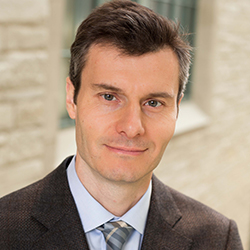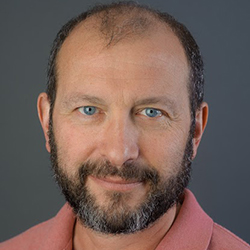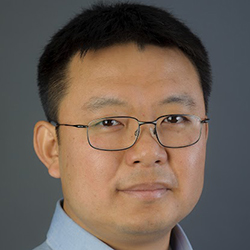Northwestern Awarded NSF Grants for Chromatin and Epigenetic Engineering Research
The grants, totaling more than $5 million, will fund three projects in this emerging area
Northwestern Engineering has received two Emerging Frontiers in Research and Innovation (EFRI) grants from the National Science Foundation to fund research in chromatin and epigenetic engineering, a new field that has the potential to jumpstart breakthroughs in biotechnology.
The two grants – plus a third, which was awarded to Northwestern as a sub-grant from the University of Chicago – total $5.4 million and will provide critical support for fundamental research for professors and their groups across Northwestern and its partner institutions.
The National Science Foundation offers EFRI grants for “transformative ideas that represent an opportunity for a significant shift in fundamental engineering knowledge with a strong potential for long term impact on national needs or a grand challenge.” Northwestern was a part of three of only eight EFRI grants in this area that were awarded this round.
 “The fact that NSF is recognizing chromatin regulation and engineering as investment-worthy bodes well for the field,” said Vadim Backman, Walter Dill Scott Professor of Biomedical Engineering. “With our interdisciplinary strategy, Northwestern is poised to become a leader in understanding how we can reprogram the genome to fight disease.”
“The fact that NSF is recognizing chromatin regulation and engineering as investment-worthy bodes well for the field,” said Vadim Backman, Walter Dill Scott Professor of Biomedical Engineering. “With our interdisciplinary strategy, Northwestern is poised to become a leader in understanding how we can reprogram the genome to fight disease.”
In addition to disease, researchers will also study chromatin as it relates to regenerative engineering, said Guillermo Ameer, Daniel Hale Williams Professor of Biomedical Engineering and Surgery and director of the Center for Advanced Regenerative Engineering (CARE). “New knowledge on how we regulate chromatin structure could help create new strategies for tissue regeneration,” he said. “The EFRI grant that was awarded through CARE will enable us to study how to prevent further scarring in the heart after a heart attack and possibly how to promote the regeneration of healthy heart tissue.”
Reprogramming the genome
Backman, who is a principal investigator on one grant and a collaborator on the other two, has pioneered physical genomics and chromatin engineering techniques. Backman’s new Center for Physical Genomics and Engineering will launch next year to help advance research in this innovative field.
Chromatin, a group of macromolecules including DNA, RNA, and proteins, houses genetic information within cells and determines which genes get suppressed or expressed. If genes are the hardware, chromatin is the software. That means, if the structure of chromatin changes, it can alter the processing, or transcription, of the information stored in the genome, but it does not alter the genes themselves. For example, a change in chromatin packing may allow cells to begin expressing certain genes that are normally suppressed, and vice versa.
Through a combination of breakthrough optical imaging and computational genomics, Backman and his collaborators have identified a chromatin “packing code” that has a major role in controlling the transcription process. The ability to regulate the chromatin packing code represents the next frontier in biological discovery.
A new tool for treating cancer, adapting cells
In the first application of this research, Backman and his colleagues developed a strategy for controlling chromatin to limit cancer cells’ ability to evolve resistance to chemotherapeutic drugs. When used in combination with chemotherapy in both cell cultures and in animal models, the technique eliminated virtually 100 percent of cancer cells in seven different types of malignancies.
 Now, Backman and his collaborators hope to further extend their knowledge of this process and apply it to other areas, including for treating diseases like Alzheimer’s and diabetes, and as a new tool for regenerative engineering. Researchers hope to better understand how chromatin is controlled by drugs and radiation to identify how to make cells more adaptable. That could help them enhance organ regeneration and limit tissue damage during heart attacks.
Now, Backman and his collaborators hope to further extend their knowledge of this process and apply it to other areas, including for treating diseases like Alzheimer’s and diabetes, and as a new tool for regenerative engineering. Researchers hope to better understand how chromatin is controlled by drugs and radiation to identify how to make cells more adaptable. That could help them enhance organ regeneration and limit tissue damage during heart attacks.
“We believe that by manipulating the genome structure, we can regulate gene transcription to impact cells’ responses to external stresses,” said Ameer. “That will ultimately enhance the adaptive potential of cells, which could facilitate tissue regeneration.”
The three funded projects are:
Macrogenomic Engineering via Modulation of Chromatin
Award: $2 million
Research team: Vadim Backman, Igal Szleifer, Hemant K. Roy, Michael Kennedy
 The grant will fund research in nanobiophotonics, computational biology, and molecular biology to continue building the foundation of physical genomics and engineering to modulate the chromatin nanoenvironment for whole-scale transcriptional engineering.
The grant will fund research in nanobiophotonics, computational biology, and molecular biology to continue building the foundation of physical genomics and engineering to modulate the chromatin nanoenvironment for whole-scale transcriptional engineering.
Researchers hope to explain the factors that determine the organization of chromatin packing and the role of the resulting chromatin environment in modulating gene networks.
They also plan to develop strategies to constrain the adaptive potential of cancer cells in pancreatic and ovarian cancers.
Epigenetic Cell Reprogramming In Situ: A Novel Tool for Regenerative Engineering
Award: $2 million
Research team: Guillermo Ameer, Panagiotis Ntziachristos, Hariharan Subramanian, Vadim Backman, Allen Taflove
 With this grant, researchers will set out to understand how chromatin nano and microstructure is controlled by pharmacological agents, morphological cues from surfaces, and low-frequency electromagnetic radiation. They will use nanoscale imaging, surface micropatterning, and molecular assays to identify which of these strategies affects a cell’s fate, with the hope of increasing the adaptability of cells.
With this grant, researchers will set out to understand how chromatin nano and microstructure is controlled by pharmacological agents, morphological cues from surfaces, and low-frequency electromagnetic radiation. They will use nanoscale imaging, surface micropatterning, and molecular assays to identify which of these strategies affects a cell’s fate, with the hope of increasing the adaptability of cells.
Longer term, these techniques could potentially allow researchers to reprogram cells in a petri dish or in the body, which may improve the survival of cells in a low-oxygen environment and enhance organ regeneration. Achieving this goal is expected to limit tissue damage during heart attacks and potentially lead to the regeneration of myocardial tissue after ischemia.
Epigenomic Regulation Over Multiple Length Scales: Understanding Chromatin Modifications Through Label Free Imaging and Multi-Scale Modeling Award: $1.2 million (subaward from University of Chicago)
Award: $1.2 million (subaward from University of Chicago)
Research team: Hao F. Zhang, Vadim Backman, Ali Shilatifard
This project aims to combine a newly developed nanoscopic imaging technology with multiscale modeling to understand the epigenetic and structural effects of gene activation, using the heat-shock gene as the model system.
“Combining new nanoscopic imaging with advanced multi-scale modeling to investigate chromatin modification will provide opportunities to answer, for the first time, questions such as whether the so-called 30-nanometer chromatin fiber actually exists and how molecular environmental changes translate into observable genetic responses,” said Hao F. Zhang, professor of biomedical engineering.